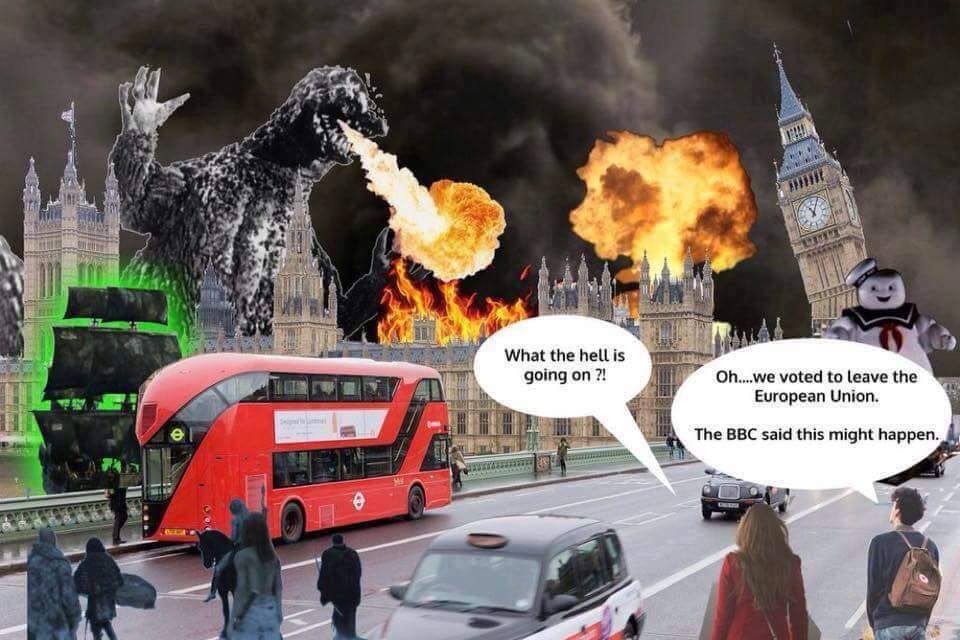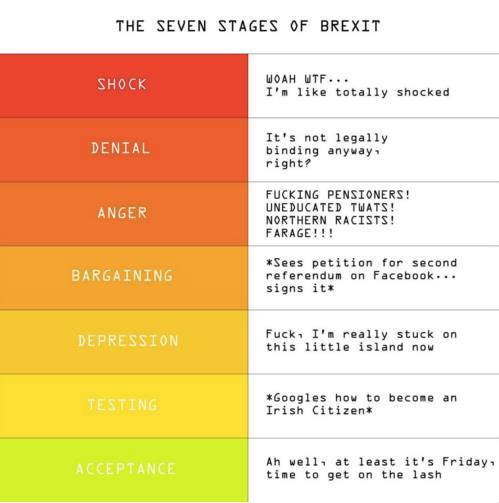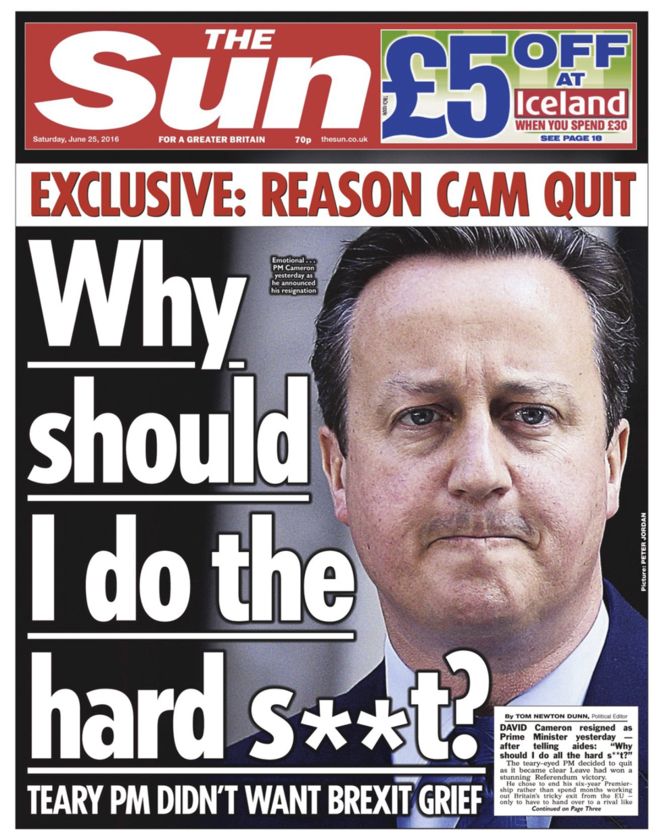
The UK has had a long weekend considering the consequences of the Brexit.
Chris Skinner has had a long weekend considering the consequences on London, the banking industry, Fintech and more … and I have to say that I’m quietly positive. I don’t think we’re going to see the meltdown the doomsayers are rumour mongering, and I don’t think we’re going to see the end of passporting our bank services across Europe.
Instead I see two scenarios most likely to play out.
Scenario One
David Cameron stepped down in a brilliant move that leaves Boris is in Catch22. The expectation had been that David Cameron would use Article 50 of the Lisbon Treaty on Friday, the day the vote came in, and then would stay until the process was completed. There were many declarations of support made on Friday morning for David to Remain as PM. But he stepped down saying Why should I do the hard shit? apparently.
This was a tactical move as, by not filing for Article 50, he’s left it to his successor to deal with the hard shit. That’s going to most likely be Boris and his position is best summarised by a comment by Teebs in the Guardian’s live coverage of developments during the weekend. Teebs believes that Cameron’s resignation has Boris “out-manoeuvred and check-mated. If [Boris] runs for leadership of the party, and then fails to follow through on triggering Article 50, then he is finished. If he does not run and effectively abandons the field, then he is finished. If he runs, wins and pulls the UK out of the EU, then it will all be over – Scotland will break away, there will be upheaval in Ireland, a recession … broken trade agreements. Then he is also finished. Boris Johnson knows all of this.”
This is why Boris was really subdued on Friday and rather than looking smug, proud and a winner, he looked worried, concerned and a bit of a loser.
There’s already been mention that the vote does not force us to Leave, but that it’s a general wish which can be over-ruled by a Parliamentary vote and is not legally binding. This would be awkward but I think that the following events are most likely:
- Boris Johnson becomes Prime Minister
- Boris does not trigger Article 50
- Boris goes to Brussels and begs for Reform
- Boris returns with two key concessions that the Leave campaign demanded and Europe hasn’t given:
- allowing the UK to leave the free movement of European people structures, and bring in domestic control of our own borders, therefore limiting migration movements; and
- exemption from the Common Agricultural Policy, which the campaign claims costs the UK billions and all goes directly into French Farmers pockets based upon a rule from 1957 that is out-of-date and unfair.
- Boris returns with said reforms and announces a second Referendum before he will trigger Article 50, based upon the achievement of these key concessions
- The second referendum results in Remain gaining a resounding win, now that the leaders of the Leave campaign back the Remain vote.
Scenario Two
It is viewed as unconstitutional for Britain to have a second referendum, and European leaders place immense pressure on the country to fast track their exit from the Union, whilst shoring up the structure for the remaining 27 countries by giving key concessions and reforms being demanded by the likes of France, the Netherlands and Italy.
This results in many key questions:
- Will Brits need new passports?
- Will they still be welcome in Europe?
- Will taxes rise?
- How will places that receive EU subsidies be funded?
- What about all the promises that were made that are now nought?
- What about my European [name country] better half?
and more.
Then we come to banking, and there’s a whole raft of other questions: what about MiFID, PSD2, passporting, capital requirements, solvency, governance, structures etc.
Now here we have all the hysterical media writing about doom for Fintech London, doom for Banking Britain and doom for the UK economy.
Yea, yea, yea. Sorry, but this doesn’t wash and is the reason why the Remain campaign lost. David Cameron and his cronies became unbelievable as every day someone warned that Britain was doomed economically if they voted to Leave. In fact, even those who wanted to Remain got fed up with each daily headline from the IMF, the Bank of England, the Institute for Fiscal Studies and the Monster Raving Looney Party all saying the world would collapse if we voted to Leave.
Image from Electomatic
What’s the reality? Nothing has changed. All the rules and regulations of Europe are in place today, just as they were on Wednesday before we voted to Leave. Therefore, what changes now is how we negotiate the Exit after Article 50 is triggered, and what we choose not to keep and what Europe determines not to deal with in a non-EU member state.
In other words, it would be Europe’s choice to punish Britain for choosing to Exit by withdrawing bank passporting. Will they do that? If they were led by the French yes, but they’re not. They’re led by the Germans and Angela Merkel has already tried to calm the waters by saying this will not be a nasty Exit.
So this is the key question: will Europe choose to ruin London, the British economy and Fintech by using the one card they hold that could possibly do that: removal of bank passporting.
This is the critical question. If they don’t, then London remains the global centre it always has and nothing changes. If they do, then most banks will need to relocate to Europe and will probably choose Dublin, as it’s nearest to US shores and almost speaks the same language. Something like that anyway.
However, if European leaders choose to punish the will of the British people by purposefully choosing to trash the one industry we believe we do well and that contributes one of the largest portions of GDP, taxes and employment in this island country, then we will know it’s war.
Do we really want that? Does anyone? Bear in mind that, as of today, we are compliant with all EU laws and – like Switzerland, Norway, Iceland and Lichtenstein – can continue to do so for the long-term if allowed, is this really worth such pettiness.
Let’s watch, wait and see as Scenario One would be the preferred result for Europe, Boris and all but hey, I bet my house that we would Remain so I wouldn’t listen to me.
Chris M Skinner
Chris Skinner is best known as an independent commentator on the financial markets through his blog, TheFinanser.com, as author of the bestselling book Digital Bank, and Chair of the European networking forum the Financial Services Club. He has been voted one of the most influential people in banking by The Financial Brand (as well as one of the best blogs), a FinTech Titan (Next Bank), one of the Fintech Leaders you need to follow (City AM, Deluxe and Jax Finance), as well as one of the Top 40 most influential people in financial technology by the Wall Street Journal's Financial News. To learn more click here...



